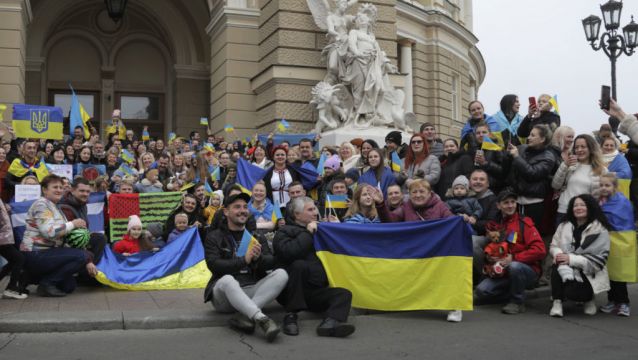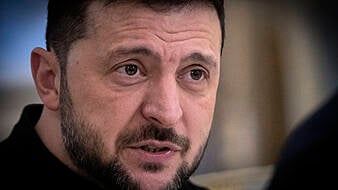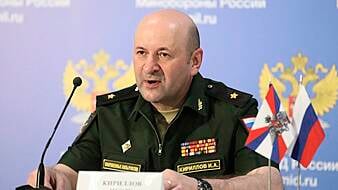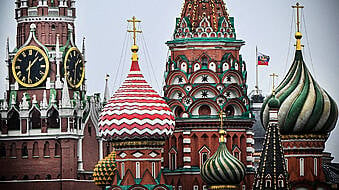Ukrainian police officers and TV and radio services returned on Saturday to the southern city of Kherson following the withdrawal of Russian troops, part of fast but cautious efforts to make the only regional capital captured by Moscow’s forces livable after more than eight months under occupation.
People across Ukraine awoke from a night of jubilant celebrating after the Kremlin announced its troops had withdrawn to the other side of the Dnieper River from Kherson.
The Ukrainian military said it was overseeing “stabilisation measures” in areas around the city to make sure it was safe.
The chief of the National Police of Ukraine, Ihor Klymenko, said in a Facebook post on Saturday that some 200 officers were at work in the city, setting up checkpoints and documenting evidence of possible war crimes.
Police teams also were working to identify and neutralise unexploded ordnance, and one sapper was injured on Saturday while de-mining an administrative building, Mr Klymenko said.

Ukraine’s communications watchdog said national TV and radio broadcasts had resumed in the city, and an adviser to Kherson’s mayor said humanitarian aid and supplies had begun to arrive from the neighbouring Mykolaiv region.
Speaking on Ukrainian TV, the adviser, Roman Holovnya, described the situation in the city as “a humanitarian catastrophe”.
He said the remaining residents lacked water, medicine, and food. Bread, he said, went unbaked because of a lack of electricity.
“The occupiers and collaborators did everything possible so that those people who remained in the city suffered as much as possible over those days, weeks, months of waiting” for Ukraine’s forces to arrive, Mr Holovnya said. “Water supplies are practically nonexistent in the city.”
The chairman of Khersonoblenergo, the region’s pre-war power provider, said electricity was being returned “to every settlement in the Kherson region immediately after the liberation and obtaining mandatory permission from the military”.
Despite the efforts to restore normal civilian life, Russian forces remain close by.
In a regular social media update on Saturday, the General Staff of Ukraine’s armed forces said the Russians were fortifying their battle lines on the river’s eastern bank after abandoning the capital. About 70% of the Kherson region remains under Russian control.
Ukrainian officials from President Volodymyr Zelensky on down cautioned that while special military units had reached Kherson city, a full deployment to reinforce the advance troops still was under way.
Latest Defence Intelligence update on the situation in Ukraine - 12 November 2022
Find out more about the UK government's response: https://t.co/3KZRVyGntj
🇺🇦 #StandWithUkraine 🇺🇦 pic.twitter.com/EZn7Ae67xH— Ministry of Defence 🇬🇧 (@DefenceHQ) November 12, 2022
Advertisement
On Friday, Ukraine’s intelligence agency said it thought some Russian soldiers stayed behind, ditching their uniforms for civilian clothes to avoid detection.
“Even when the city is not yet completely cleansed of the enemy’s presence, the people of Kherson themselves are already removing Russian symbols and any traces of the occupiers’ stay in Kherson from the streets and buildings,” Mr Zelensky said in his nightly video address on Friday.
Mr Zelensky said the first part of the stabilisation work included de-mining operations. He said the entry of “our defenders” – the soldiers – into Kherson would be followed by police, sappers, rescuers and energy workers, among others.
“Medicine, communications, social services are returning,” he said. “Life is returning.”
Photos circulating on Saturday on social media showed Ukrainian activists removing memorial plaques put up by the occupation authorities the Kremlin installed to run the Kherson region.
A Telegram post on the channel of Yellow Ribbon, a self-described Ukrainian “public resistance” movement, showed two people in a park taking down plaques picturing what appeared to be Soviet-era military figures.
Moscow’s announcement that Russian forces planned to withdraw across the Dnieper River, which divides both the Kherson region and Ukraine, followed a stepped-up Ukrainian counter-offensive in the country’s south.
In the last two months, Ukraine’s military claimed to have reclaimed dozens of towns and villages north of Kherson city, and the Ukrainian General Staff said that is where the stabilisation activities were taking place.

The Russian retreat represented a significant setback for the Kremlin some six weeks after Mr Putin annexed the Kherson region and three other provinces in southern and eastern Ukraine in breach of international law and in the face of widespread condemnation.
The Russian leader unequivocally asserted the illegally claimed areas as Russian territory.
Russian state news agency Tass quoted an official in Kherson’s Kremlin-appointed administration on Saturday as saying that Henichesk, a city on the Azov Sea some 125 miles south-east of Kherson city, would serve as the region’s “temporary capital” after the withdrawal across the Dnieper.
Ukrainian media derided the announcement, with daily newspaper Ukrainska Pravda saying Russia “had made up a new capital” for the region.
While much of the focus was on southern Ukraine, Russia continued its grinding offensive in Ukraine’s industrial east, targeting in particular the Donetsk region city of Bakhmut, the Donetsk region, the Ukrainian General Staff said.
Donetsk governor Pavlo Kyrylenko reported on Saturday that two civilians were killed and four wounded over the last day as battles heated up around Bakhmut and Avdiivka, a small city that has remained in Ukrainian hands throughout the war.
Russia’s continued push for Bakhmut demonstrates the Kremlin’s desire for visible gains following weeks of clear setbacks.
Taking the city would open the way for a possible push on to other Ukrainian strongholds in the heavily contested Donetsk region.
A reinvigorated eastern offensive could also potentially stall or derail Kyiv’s ongoing advances in the south.
In the Dnipropetrovsk region west of Donetsk, Russia kept up its shelling of communities near the Zaporizhzhia Nuclear Power Plant, the Ukrainian regional governor said. Russia and Ukraine have long traded blame for shelling in and around the plant, Europe’s largest.
Jake Sullivan, the White House national security adviser, reemphasised that the United States would defer to Ukrainian authorities on whether or when to negotiate with Russia about a possible end to the conflict.
“Russia invaded Ukraine,” Mr Sullivan told reporters on Air Force One en route to Phnom Penh, Cambodia, as part of a trip by President Joe Biden to international summits in Southeast Asia.
“If Russia chose to stop fighting in Ukraine and left, it would be the end of the war,” Mr Sullivan said. “If Ukraine chose to stop fighting and give up, it would be the end of Ukraine.”







